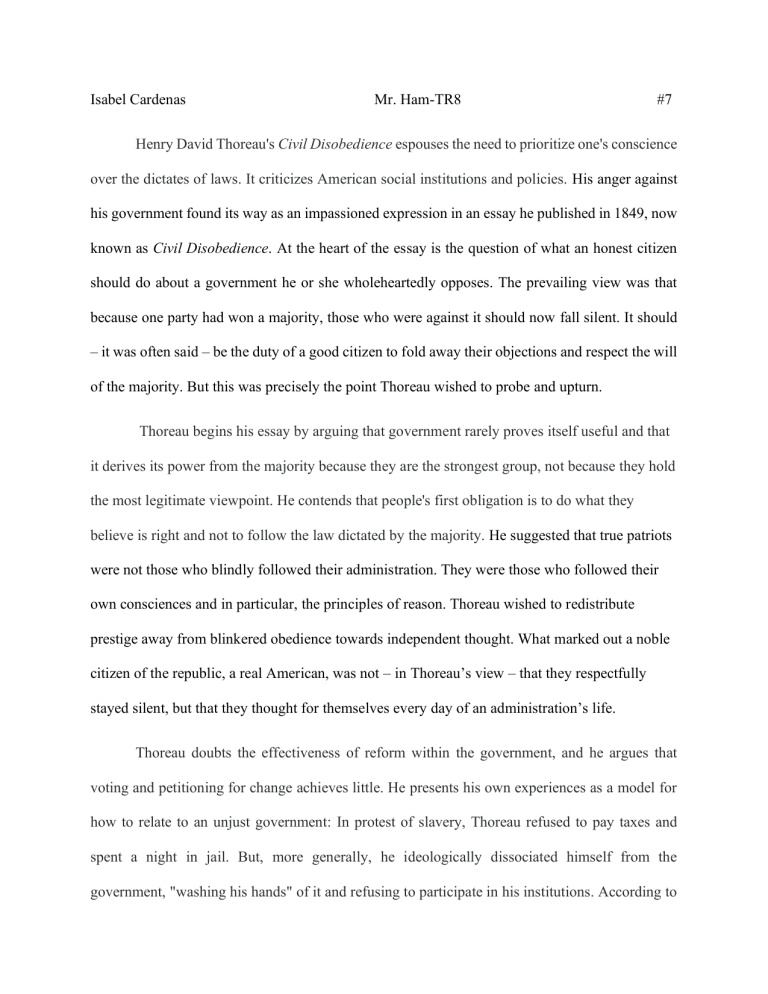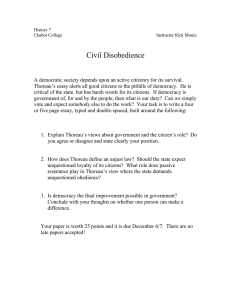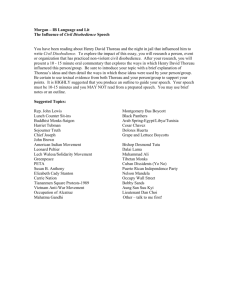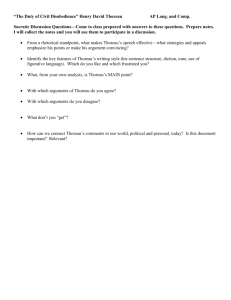
Isabel Cardenas Mr. Ham-TR8 #7 Henry David Thoreau's Civil Disobedience espouses the need to prioritize one's conscience over the dictates of laws. It criticizes American social institutions and policies. His anger against his government found its way as an impassioned expression in an essay he published in 1849, now known as Civil Disobedience. At the heart of the essay is the question of what an honest citizen should do about a government he or she wholeheartedly opposes. The prevailing view was that because one party had won a majority, those who were against it should now fall silent. It should – it was often said – be the duty of a good citizen to fold away their objections and respect the will of the majority. But this was precisely the point Thoreau wished to probe and upturn. Thoreau begins his essay by arguing that government rarely proves itself useful and that it derives its power from the majority because they are the strongest group, not because they hold the most legitimate viewpoint. He contends that people's first obligation is to do what they believe is right and not to follow the law dictated by the majority. He suggested that true patriots were not those who blindly followed their administration. They were those who followed their own consciences and in particular, the principles of reason. Thoreau wished to redistribute prestige away from blinkered obedience towards independent thought. What marked out a noble citizen of the republic, a real American, was not – in Thoreau’s view – that they respectfully stayed silent, but that they thought for themselves every day of an administration’s life. Thoreau doubts the effectiveness of reform within the government, and he argues that voting and petitioning for change achieves little. He presents his own experiences as a model for how to relate to an unjust government: In protest of slavery, Thoreau refused to pay taxes and spent a night in jail. But, more generally, he ideologically dissociated himself from the government, "washing his hands" of it and refusing to participate in his institutions. According to Thoreau, this form of protest was preferable to advocating for reform from within government; he asserts that one cannot see the government for what it is when one is working within it. When a government is unjust, people should refuse to follow the law and distance themselves from the government in general. A person is not obligated to devote his life to eliminating evils from the world, but he is obligated not to participate in such evils. This includes not being a member of an unjust institution, like the government. ‘‘All machines have their friction,’’ Thoreau admitted, but when injustice is too great, you should ‘‘let your life be a counter-friction to stop the machine.’’ Thoreau didn’t advocate the non-payment of taxes as a rule. The non-payment was just one example of the many non-violent ways that a democratically elected government could and must be resisted when its actions veer into aggression and unreason. An election settles who the president might be, it doesn’t determine that everything that president does is right or that one should simply do nothing until the next election. Above all, Thoreau hated political passivity. Sarcastically he wrote: ‘‘There are thousands who are in opinion opposed to slavery and to the war, who yet in effect do nothing to put an end to them; who, esteeming themselves children of Washington and Franklin, sit down with their hands in their pockets, and say that they know not what to do, and do nothing.’’ This would not be his way: ‘‘How does it become a man to behave toward this American government today? I answer, that he cannot without disgrace be associated with it.’’ He argued that the citizen must never just ‘‘resign his conscience to the legislation’’ and put himself ‘‘at the service of some unscrupulous man in power.’’ He mocked that ‘‘most legislators, politicians, lawyers, ministers, and office-holders are as likely to serve the devil, without intending it, as God.” Thoreau would not be such a servant. This most American of writers knew exactly whom it was right for him to serve: his own mind and conscience.




